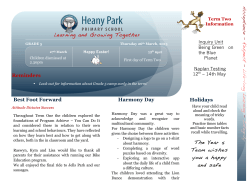
Clear ANSWERS to Questions that Matter
Clear ANSWERS to Questions that Matter Harmony Prenatal Test evaluates the risk for trisomies 21, 18, and 13 with unsurpassed accuracy in women of any age or risk category A Higher Standard of Care in TRISOMY TESTING AS EARLY AS 10 WEEKS, the Harmony Prenatal Test assesses the risk of trisomy 21 with unsurpassed accuracy in pregnant women, of any age or risk. In the first and only prospective blinded study of its kind published in the New England Journal of Medicine, the Harmony Prenatal Test proved superior to traditional first trimester combined screening for both detection rate and false-positive rate.15 Harmony is Validated in Women of All Ages 2-8, 11-13, 15 • Harmony Prenatal Test is clinically validated for use in pregnant women, of any age or risk category, to assess the likelihood of fetal trisomies 21, 18 and 13 • Harmony is the most broadly studied cell-free DNA-based maternal blood test o Blinded clinical studies in >22,000 women of all ages o Over 400,000 pregnancies tested worldwide Harmony Outperforms First Trimester Combined Screening (FTS*) in both Detection and False-Positive Rate in a head to head comparison blinded study (n=15,841) Study Results Study Population Women (age 18-48, mean age of 30.7) with singleton pregnancies between 10 to 14 weeks gestation. p=0.008 Detection Rate (more than 1 in 5 affected pregnancies Study Design 18,955 enrolled & each woman received both First Trimester Screening (FTS*) n=15,841 & Each pregnancy was followed. Outcome data obtained by: Harmony Prenatal Test (Results blinded) Genetic testing (38 of 38) FTS* (30 of 38) 100% 79% p<0.001 False-Positive Rate Harmony (9 of 15,803) 0.06% (Harmony reduces false-positives by more than 90-fold) FTS* (854 of 15,803) 5.4% or Newborn exam n=15,841 (women with both FTS* and Harmony and outcome data) *Serum PAPP-A, total or free ß-hCG & Nuchal Translucency may go undetected with FTS*) Harmony Positive Predictive Value (PPV) (likelihood that a positive result is confirmed on diagnostic testing, based on false-positive rate and population frequency) p<0.001 Harmony Prenatal Test FTS* 3.4% 81% CLEAR ANSWERS TO QUESTIONS THAT MATTER Unsurpassed ACCURACY Harmony Prenatal Test delivers unsurpassed accuracy when compared to any other trisomy 21 blood test. In blinded studies of over 22,000 pregnant women age 18 to 50 for trisomy 21: Harmony Performance Across All Blinded Studies 2-7, 15 Trisomy 21 PERFORMANCE COMBINED PERFORMANCE (Trisomies 21, 18, 13)14 DETECTION RATE >99% DETECTION RATE 99% FALSE-POSITIVE RATE <0.1% FALSE-POSITIVE RATE <0.1% The Difference in Performance is Clear This study of blinded prospective 15,841 patients compares First Trimester Combined Screening (FTS*) with Harmony in a general pregnancy population.15 • The Harmony test accurately identified all 38 trisomy 21 cases, versus 30 out of 38 with FTS*. • F TS* produced 5.4% (n=854) false-positives, compared to Harmony which had 0.06% (n=9) false-positives for trisomy 21 First Trimester Screening Harmony Prenatal Harmony Prenatal Test Test Harmony Prenatal Test 99 99 10 10 10 10 10 10 1 Positive is risk ≥ 1 100 T21 risk (%) T21 risk (%) 1 1 T21 risk (%) (%) ≥ 1/100 PositiveT21 is risk risk 99 Positive is risk ≥ 1 100 99 Positive is risk ≥ 1 270 99 99 Positive is risk ≥ 1 270 T21 risk (%) (%) ≥ 1/270 PositiveT21 is risk risk First Trimester Combined First Trimester Screening Screening 1 T21 True-positives 0.1 0.1 0.1 1 1 0.1 0.1 0.1 T21 True-negatives 15,794 Harmony low-risk results @ < 1 in 10,000 8 T21 False-positives 0.01 0.01 0.01 10 10 10.5 10.5 11 11 11.5 11.5 12 12 12.5 12.5 Gestational age (wks) 13 13 0.01 1013.5 13.5 10.514 14 11 Gestational age (weeks) T21 True−positives T21 True−negatives 11.5 T21 False-negatives 1210 12.5 10.5 Gestational age (wks) T21 False−positives 1311 13.5 11.5 T21 False−negatives T21 True−positives Exceptional Positive Predictive Value for the General Population • 3.4% for first trimester screening versus 81% for Harmony (PPV is the likelihood that a positive result is confirmed on diagnostic testing, based on false-positive rate and population frequency) Harmony’s Targeted Technology Yields Optimal Results • Only Harmony uses a unique targeted approach to more accurately assess the chromosomes of interest. • Harmony’s methodology includes precise measurement of the amount of fetal DNA and incorporates it into the risk assessment, providing a more accurate result. 0.01 0.01 1412 12.5 Gestational age (wks) T21 True−negatives 13 10.514 11 1013.5 10.5 11.5 12 12.5 12.5 Gestational age (wks) 13 13.5 13.5 14 14 Gestational age (weeks) T21 False−positives T21 False−negatives Clear Answers Early to Reduce Follow-up The greater accuracy and low false-positive rate of Harmony compared to traditional tests may minimize the chance further testing would be recommended due to a falsepositive result. Optional Fetal Sex Chromosome Assessment • Information on sex chromosome aneuploidies can be requested. o Including risk for monosomy X, XXX, XXY, XYY, and XXYY. *Serum PAPP-A, total or free ß-hCG & Nuchal Translucency Clear answers to questions that matter. Why Choose Harmony? • Unsurpassed accuracy for any age or risk o Blinded studies in over 22,000 women of all ages o Less than 0.1% false-positive rate for trisomy 21 • Most widely used test–in over 400,000 pregnancies and over 100 countries • Performed as early as 10 weeks • May minimize invasive procedures caused by false-positive results Three Steps to Clarity 1. Draw a maternal blood sample at 10 weeks or later in pregnancy. 2. Submit sample directly to Ariosa Diagnostics or through one of our clinical laboratory partners. 3. Receive results in about 7 business days or less. Visit us at harmonytest.com For assistance email clientservices@ariosadx.com or call 1-855-9-ARIOSA (855-927-4672) Outside the USA, call +1 925-854-6246 Non-invasive prenatal testing based on cell-free DNA analysis is not considered diagnostic. © 2015 Ariosa Diagnostics, Inc. All Rights Reserved. ARIOSA, the Ariosa Logo, ARIOSA DIAGNOSTICS, the Ariosa Diagnostics Logo, HARMONY PRENATAL TEST and HARMONY are trademarks or registered trademarks of Ariosa Diagnostics, Inc. in the U.S.A. and other countries. All other trademarks are the property of their respective owners. MM-00432-040115-Rev2.0 1. ACOG Practice Bulletin No. 77. Obstet Gynecol 2007;109:217-27. 2. Sparks AB et al., Am J Obstet Gynecol. 2012 Apr;206(4):319.e1-9. 3. Ashoor G et al., Am J Obstet Gynecol. 2012 Apr;206(4):322.e1-5. 4. Norton M et al., Am J Obstet Gynecol. 2012 Aug;207(2):137.e1-8. 5. Nicolaides KH et al., Am J Obstet Gynecol. 2012 Nov;207(5):374.e1-6. 6. Ashoor G et al., Ultrasound Obstet Gynecol. 2013 Jan;41(1):21-5. 7. Verweij EJ et al., Prenat Diagn. 2013 Oct;33(10):996-1001. 8. Data on file at Ariosa Diagnostics, Inc. 9. Palomaki G et al., Genet Med. 2011 Nov;13(11):913-20. 10. Bianchi D et al., Obstet Gynecol. 2012 May;119(5):890-901 11. Hooks J et al., Prenat Diagn. 2014 May;34(5):496-9. 12. Nicolaides K et al., Fetal Diagn Ther. 2014;35(1):1-6. 13. Gil M et al., Fetal Diagn Ther. 2014;35:204-11. 14. Estimate based on an average-risk population with prevalence for T21, T18, and T13 of 1 in 700, 1 in 5000, and 1 in 16000 respectively. 15. Norton M, et al, NEJM DOI: 10.1056/NEJMoa1407349 (published online April 1, 2015)
© Copyright 2025









